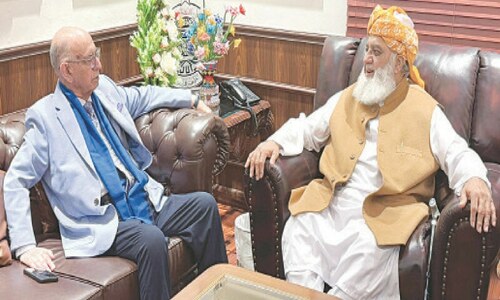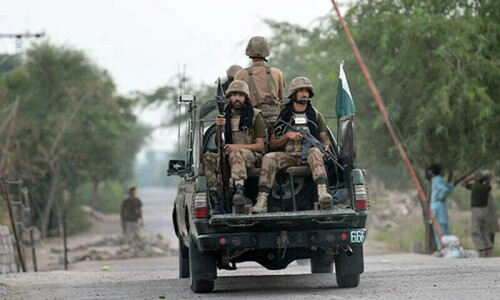IF a senator belonging to the PML-N is claiming to lead a rebellion, shouldn’t that cause some alarm within the ruling party? Or is it that the chasm is so far not big enough to worry Messrs Sharif and company?
The Khosas, the old PML-N family in Dera Ghazi Khan, are unhappy with the party leadership. Dost Muhammad Khosa, who had the honour of filling in for Shahbaz Sharif as the chief minister when Shahbaz was briefly removed from office in the wake of the emergency imposed by the PPP government in 2009, has been promising a PML-N forward bloc for some time. He upped the ante just when the PTI dharna was on in Islamabad and the PTI meetings all over Punjab were drawing large crowds.
Dost came on the television to say that many ‘disgruntled’ members of the PML-N subscribed to his views. The unrest has been confirmed by Dost’s father and long-time PML-N emblem, Sirdar Zulfiqar Khan Khosa. There is, however, little evidence as yet that the problem extends beyond the Khosa territory of Dera Ghazi Khan.
The relationship between the Zulfiqar Khosa family and the powerful Sharif dynasty has been deteriorating over time.
The relationship between the Zulfiqar Khosa family and the powerful Sharif dynasty has been deteriorating over time. Events in more recent times show the Sharif focus has shifted to some other influential families and individuals in D.G. Khan. And it is apparent that it is Shahbaz who is more involved in the area’s politics than the elder brother Prime Minister Nawaz Sharif.
If the Khosas believed that their selection for the short-term guardianship of the chief minister’s office in 2009 signalled some special favours were about to accrue to them, their hopes were soon dashed. There was a feeling that with time Zulfiqar Khosa’s utility as a PML-N front-liner faded. Just as his sons were considered either too adventurous — in the case of Dost — or too laid back — in the case of Saifuddin — the PML-N leadership felt the need for cultivating some other powerful political families and individuals to establish their grip on local politics.
The PML-N’s embracing of select powerful families in D.G. Khan was dictated by an understanding of the fall in the appeal of the Khosas and it left the Khosas even weaker.
For instance, Hafiz Abdul Karim, a wealthy businessman with an Ahle Hadith background who represents the PML-N from the D.G. Khan’s city area, has made deep inroads into the traditional Khosa support base. At the same time, the heirs to late president Farooq Leghari, too, are placed in the PML-N camp currently, even if they would have obviously wanted greater prominence within their new political home than has been so far given to them.
Not only that, Shahbaz Sharif, who had provided an inkling to his interests in D.G. Khan by contesting a provincial assembly seat from there in 2013 election, chose a scion of another Baloch tribe in the area, the Gurchanis, for the post of the deputy speaker Punjab Assembly. The PML-N was also able to at least get some support from another big political family and traditional rival of the Khosas for the regional leading player’s honours, the Mazaris.
All this indicates shrinking space for the Khosas locally, which was the base upon which Sirdar Zulfikar Ali Khan Khosa had built his Punjab or national status over all these decades.
The family, it seems, is all too aware of the emptiness of the honorific of senator that Zulfiqar Khosa carries before his name currently. It must be hoping that the noise it makes on the national stage, the split it threatens the PML-N with, will help it revive its fortunes at the local level. This is a struggle towards regaining some prominence, towards finding some kind of a vantage point, before the decision to change parties is made.
The ‘revolt’ is to a great degree sustained by the theory of ‘the establishment’ working its pawns against the Sharif government, but for the Khosas it is as much a fight for personal survival as so many others before them have faced.
Usually, a leading political family spurned by the leadership of one political party has the automatic choice of crossing over to the rival camp. Saifuddin Khosa, Zulfiqar Khosa’s eldest son, exercised that option when he contested on a PPP ticket in the 2013 election, but the experiment was termed as futile given the fall in the PPP’s graph generally.
Another option — the PTI — would be a little tough to negotiate right now because of, along with other factors, the reputation of Dost Khosa after he was implicated in the disappearance and possible murder of an actress in Lahore a few years ago.
A party that is considered to be rising and which hopes to attract queues of those aspiring to join, it is so presumed at this moment, wouldn’t want to be cosying up to someone with such an unflattering past. On the other hand, the ripples of revolt within the PML-N created by the restive Khosas serve Imran Khan’s purpose well, and the Khosas might hope that they will eventually be rewarded for this, ideally with Dost Khosa asked to keep a low profile for a while.
If you talk to political activists from southern Punjab, there would be some who predict a large-scale switchover to the PTI. So far, however, it remains a war of statements by the office-bearers of the PML-N and the PTI. Amid allegations of horse-trading, even the PML-N has not been able to cause any major dent in the PTI group of parliamentarians who ‘want to’ resign en masse. And so far, the PTI’s counter talk of defections is just that — talk. As always, the crossovers will come only when an election is imminent.
The writer is Dawn’s resident editor in Lahore.
Published in Dawn, November 14th, 2014












































